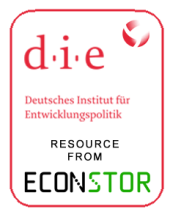Land Library
Welcome to the Land Portal Library. Explore our vast collection of open-access resources (over 74,000) including reports, journal articles, research papers, peer-reviewed publications, legal documents, videos and much more.
/ library resources
Showing items 1 through 9 of 293.Water- and land-related resource conflicts are the starting point of the Zambian nexus study. Zambia is endowed with abundant land and water resources, the utilisation of which offers huge potential for the country’s economic development.
Irrigation can help to improve and stabilise agricultural productivity, thereby contributing to food security and to resilience against climate change.
The diffusion of supermarkets in developing countries has profound implications – not only for existing retail stores and informal vendors but also for millions of producers and intermediary traders in the respective supply chains, and for consumers in these countries.
In 2015 the global community committed itself to an ambitious programme of reform. Achieving the Sustainable Development Goals and implementing the resolutions of the Paris climate conference require that great efforts are made – including those of a financial nature.
This report presents the results of a small scale household survey that was conducted in May
2015 to assess the extent to which rural Rwandan citizens are vulnerable or resilient to
environmental, market and land tenure risks and the level they understand the laws and rights
Residential land in Rwanda is scarce due to hilly terrain, a high population and a focus on agricultural growth to address food security concerns.
In order to stimulate revenue mobilisation and local autonomy, some governments decentralise property taxes to the municipal level.
Reducing Emissions from Deforestation and Forest Degradation (REDD+) is a mitigation instrument that creates a financial value for the carbon stored in standing forests.
Between October 2014 and October 2015, Radio Ishingiro with the support of USAID
Land Project implemented a Communications Campaign focused on influencing the
attitudes and mindsets of men and boys about gender-equal land rights to overcome




